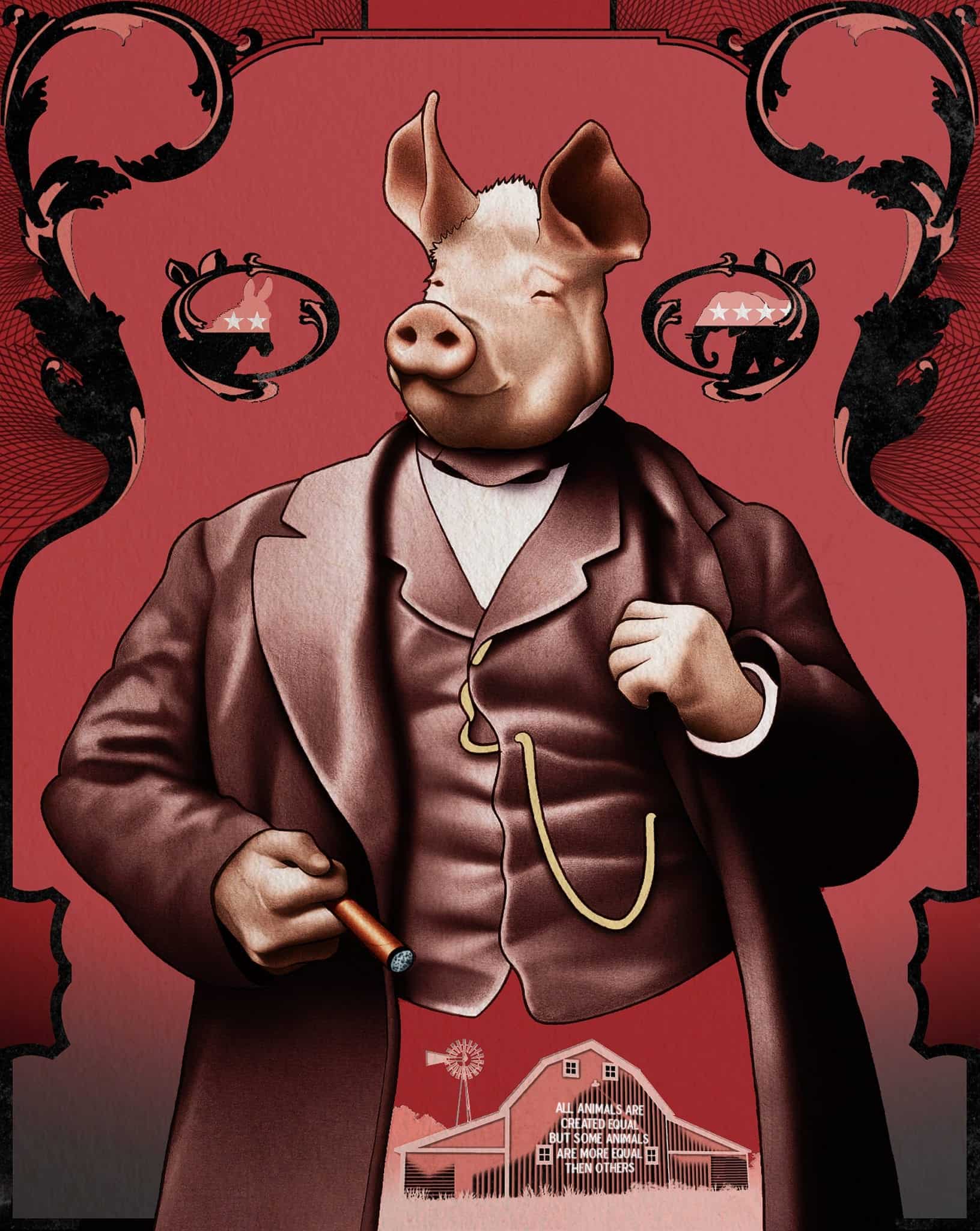How Is Animal Farm Relevant To The 21st Century
Author: bodie robinson| A & C Writer

Credit: Carl Glover via Flickr
Our A&C writer takes you lot dorsum to high school, but not really.
In a 2014 article regarding Edmund Burke's letter, Reflections on the Revolution in French republic , Christopher Hitchens wrote, "the tremendous power of the Reflections lies in this, the first serious argument that revolutions devour their ain children and turn into their own opposites." Burke's Reflections was a counterrevolutionary certificate that decried the French Revolution—both in its methods and its goals. Among the nigh prescient passages in Burke's letter is his prediction of the ascension of a charismatic and dictatorial military general. Burke writes that the revolutionary insurrections in France, beginning with the storming of the Bastille in July 1789 in Paris, would culminate in a ability vacuum—ripening conditions for a military dictatorship. And, of course, Shush was right. The charismatic martial dictator that he envisaged would go Napoleon Bonaparte.
Hitchens dubbed Burke a "reactionary prophet." But still prophetic Shush's Reflections are, today the letter remains inappreciably annihilation more than anachronistic ramblings confronting a progressive revolution whose ethics, more or less, now dominate about of the Western world. At all-time, Shush's letter is a quaint curiosity in the history of political thought. George Orwell'south novella, Creature Subcontract, on the other hand, delivers a critique of revolutionary politics that is both leftist (Orwell declared himself a "democratic socialist") and even so pertinent.
I won't belabour the plot of the book, because I presume that many readers are already familiar plenty with Animal Farm. Only what must be understood is the following: Brute Farm is a critique of the Soviet Spousal relationship, its ideology, Marxism-Leninism, its callous authoritarianism both domestic and foreign, and the cult of personality, which developed around Joseph Stalin.
Orwell's critique is adult through an apologue. The story is set on a modest farm in England owned past a lazy, alcoholic farmer, Mr. Jones. The animals on the farm, led past a vanguard of pigs, gain class-consciousness and remove Mr. Jones from the subcontract. The animals adhere to a revolutionary theory chosen Animalism. Animalism argues that humanity is a parasitic ruling class that exploits the labour of subcontract animals in order to maintain their ain gluttonous lifestyles. In short, the animals have their labour heavily exploited by humans. And in substitution for their labour, humans provide the animals with the basic means of subsistence: a steeple over their heads and nutrient in their troughs. The animals make up one's mind that they no longer require humans to organize themselves and that they are entitled to the whole value of their labour, as opposed to assuasive humans extract virtually of the fruits of creature labour. The result is a coup, and the animals forcibly remove Mr. Jones. The Animalist revolution purports to have freed all the farm animals from Mr. Jones' oppressive fetters. Audio familiar?
Once the animals take control of Mr. Jones' farm and successfully defend it against a human counterrevolution – called The Battle of the Cowshed – the animals brainstorm to implement their Animalist economic and social policies. The pigs, the most intelligent of the animals, speedily institute themselves as a bureaucratic class on the animal farm. The revolutionary theory of Animalism is simplified into vii commandments. Since many of the animals can't read, the commandments are simplified and compacted into ii supreme maxims: "four legs good, two legs bad," and "all animals are equal." The sheep are especially prone to excitement by these slogans and they repeat them constantly. Throughout the duration of the Animalist regime, ability becomes more and more concentrated into the pigs' bureaucracy, until the entire subcontract is under the control of one pig alone – his name is Napoleon. This should sound familiar.
Subsequently many years accept passed since the Animalist revolution, Napoleon and his hierarchy of pigs impose the same harshness of labour on animals that the humans – the original oppressors – did. The pigs receive special treatment. They live in Mr. Jones' farmhouse, potable alcohol, eat rich foods off of fancy human silverware. The land of fauna farm becomes indistinguishable from the weather that the human regime subjected them to. Indeed, the pigs themselves begin to resemble their former masters. Napoleon starts wearing a bowler hat, wields a bullwhip, and, along with the rest of the pigs, walks on his hind legs. This results in a slight alteration of Animalism's two fundamental maxims, which the sheep shout enthusiastically: "four legs good, two legs better," and "all animals are equal, merely some animals are more equal than others."
The tremendous ability of Animal Farm therefore lies in this, Orwell'due south correct assessment of the Soviet Union equally an authoritarian regime which, by threats external only especially internal, would inevitably collapse in on itself and brainstorm to resemble cipher that information technology originally claimed itself to be. The history of the twentieth century is a attestation to Orwell'due south lesson in Creature Subcontract: Marxism-Leninism only didn't work. And the relevance of Orwell'southward allegory yet persists, peculiarly for those of u.s. on the left who struggle with the question of socialism. What went wrong? Was it a practical upshot or a theoretical one? Can it be corrected? And if and so, what is to be done?
Source: https://www.carillonregina.com/animal-farm-still-matters/
Posted by: nelsonbehateror.blogspot.com

0 Response to "How Is Animal Farm Relevant To The 21st Century"
Post a Comment